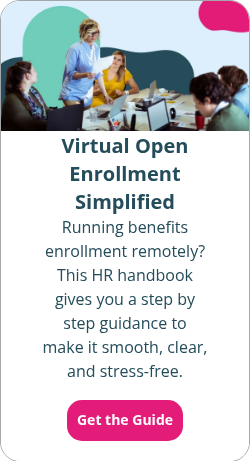How to plan an HR budget
By Holly Bengfort on January 9, 2024 at 9:21 AM
Creating a budget is often a daunting task, especially when it comes to creating one for the human resources department at your organization. However, planning an annual HR budget is crucial since it helps you manage and allocate resources effectively. Whether you're a small employer or part of a large corporation, having a well-thought-out HR budget can contribute to the success of your overall business strategy.
In this article, we'll explore key steps and considerations for planning an HR budgeting strategy that meets your organization’s unique needs.
Takeaways from this blog post:
- Planning an HR budget is crucial for effective resource allocation and managing the workforce within an organization.
- Organizations have different approaches to effective budgeting, including incremental and zero-based budgeting.
- An HR budget includes funds for expenses such as talent acquisition, employee benefits and compensation, employee relations, and HR technology and software costs.
What is an HR budget?
An HR budget is a financial plan that outlines the expenses of managing and supporting an organization’s workforce. It involves estimating and tracking the costs associated with various HR activities, such as employee compensation, recruitment, and HR technology systems.
Organizations usually use one of the following budgeting approaches:
- Incremental budgeting: This method involves making minor adjustments to last year's budget based on the inflation rate and anticipated changes in personnel needs. Incremental budgets are a simple way to adjust for cost fluctuations without completely overhauling the financial plan.
- Zero-based budgeting: This is a clean-slate approach where you justify each expense from scratch every year. Zero-based budgets are more time-consuming, but they help identify inefficiencies. They also allow for better allocation of resources based on value.
Why is HR budgeting important?
The HR budget serves as a planning tool for HR managers to ensure they set aside sufficient funds to support the organization's strategic goals and objectives. It also helps organizations monitor and control costs, make informed decisions on resource allocation, and ensure you manage HR functions effectively and efficiently within the dedicated budget.
What does an HR budget include?
When planning an HR budget, it's important to consider a variety of factors and expenses that are relevant to the management and development of your workforce.
Here are some key elements1 organizations commonly include in an HR budget:
- Talent acquisition
- Job advertising
- Recruitment costs
- Interviewing and screening candidates
- Employee relocation
- Remote office setup
- Onboarding
- Learning and development
- Training
- Addressing skills gaps
- Employee certifications
- HR upskilling
- HR certifications
- Personal training budgets for HR employees
- Employee benefits and compensation
- Employee salaries and raises
- Health insurance or alternative health benefits
- Life insurance
- Retirement plans
- Paid time off (PTO)
- Overtime pay
- Lifestyle perks
- Bonuses and incentive programs
- Employee relations and talent management
- Employee engagement
- Nurturing a positive company culture
- Team building and coaching
- Employee health and well-being
- Wellness programs
- Employee mental health
- Physical safety compliance
- Security at work
- HR technology and software costs
- Human resource information system (HRIS)
- Human resource management system (HRMS)
- Human capital management (HCM)
- Benefits administration software
How do you plan an HR budget?
Planning an HR budget requires a comprehensive understanding of the department's goals, current workforce needs, and anticipated future demands. Here are some key steps to consider when you start your budgeting process:
1. Assess your HR needs
The first step in HR budget planning is to assess your organization's HR needs. Consider the current and future workforce requirements, including hiring, training, and employee development. Identify potential gaps in your HR processes and determine the areas that need improvement. This will help you allocate resources effectively and prioritize your HR expenses.
2. Analyze previous HR expenditures
Take a close look at your previous HR expenditures to understand where you allocated the majority of your annual budget. Identify any areas where overspending or underspending occurred. This analysis will provide insights into where you can make adjustments.
3. Align HR objectives with organizational goals
It's important to align your HR objectives with your organization's overall goals and strategies. For example, if your company aims to expand into new markets, your HR budget should include resources for hiring and training employees who can support this expansion. By aligning your HR budget with your organizational goals, you ensure that your HR activities contribute directly to the success of the business.
4. Consider market trends and benchmarks
Stay updated on industry trends and benchmarks when planning your HR budget. This will help you gauge whether your budget aligns with industry standards. You want to consider factors such as average compensation, benefits packages, and employee turnover rates to ensure that your budget remains competitive in attracting and retaining top talent.
5. Involve key stakeholders
When planning your HR budget, involve key stakeholders, such as department heads and executives. Their input and insights can provide a holistic perspective on the HR needs of the organization. Collaborative decision-making will also help you gain buy-in and support for your HR budget from other departments.
6. Prioritize investments
Lattice's State of People Strategy Report2 found that employee engagement and performance management were the leading priorities for HR teams in 2023. For your organization, you want to evaluate all the HR initiatives and projects you have planned and prioritize them based on their potential impact on the organization. This will help you allocate your department budget to areas that offer the greatest return on investment.
7. Monitor and track expenses
Once your well-planned HR budget is in place, monitoring and tracking your expenses is important. This will help you identify any budget deviations and take corrective action if necessary. Review your budget plan periodically and make adjustments if there are any unforeseen changes in your business environment.
How can PeopleKeep help your HR department?
HR departments have enough on their plates. Administering your employee benefits can be time-consuming and costly. You can reduce their administrative tasks and overall workload by partnering with PeopleKeep. Our health reimbursement arrangement (HRA) software makes it easy to set up and manage your benefits in minutes each month.
With an HRA, you can ditch expensive and complicated group health insurance policies for a more flexible and budget-controlled alternative. HRAs allow you to reimburse your employees tax-free for qualifying medical expenses, which can include individual health insurance premiums.
With PeopleKeep, you can offer the following HRAs:
- The qualified small employer HRA (QSEHRA): A QSEHRA is for small employers with fewer than 50 full-time equivalent employees (FTEs). It's a cost-effective alternative to traditional group health insurance.
- The individual coverage HRA (ICHRA): An ICHRA is for businesses of all sizes. With an ICHRA, there are no maximum contribution limits. Employers can also vary allowances and eligibility by employee classes.
- The group coverage HRA (GCHRA): A GCHRA supplements a group health insurance plan. It helps employees with their out-of-pocket expenses that the group plan doesn’t cover.
Our expert team and modern software handle the most time-consuming aspects of offering an HRA for you, giving you more time to spend on other tasks.
Offering an HRA can help attract job seekers and retain top talent at your organization. Our 2022 Employee Benefits Survey Report found that 82% of employees say that the benefits package an employer offers is an important factor in whether or not they accept a job.
Conclusion
A human resources budget plan requires time and effort. But with careful planning and consideration, you can develop an effective HR budget that aligns with your organization's strategic objectives and supports the overall success of your workforce.
Check out more resources
See these related articles

Small business health insurance costs: What can you expect?
Curious about the costs of small business health insurance? Get an overview of what to expect and plan ahead for your budget with this informative guide.

How to get help choosing an individual health insurance plan
Need help choosing health insurance? Explore how to compare individual plans, get expert guidance, and find coverage that fits your needs and budget.

The four best health insurance options for solo pastors
Churches with solo pastors often face budget constraints, but there are several ways they can still afford health insurance benefits.



